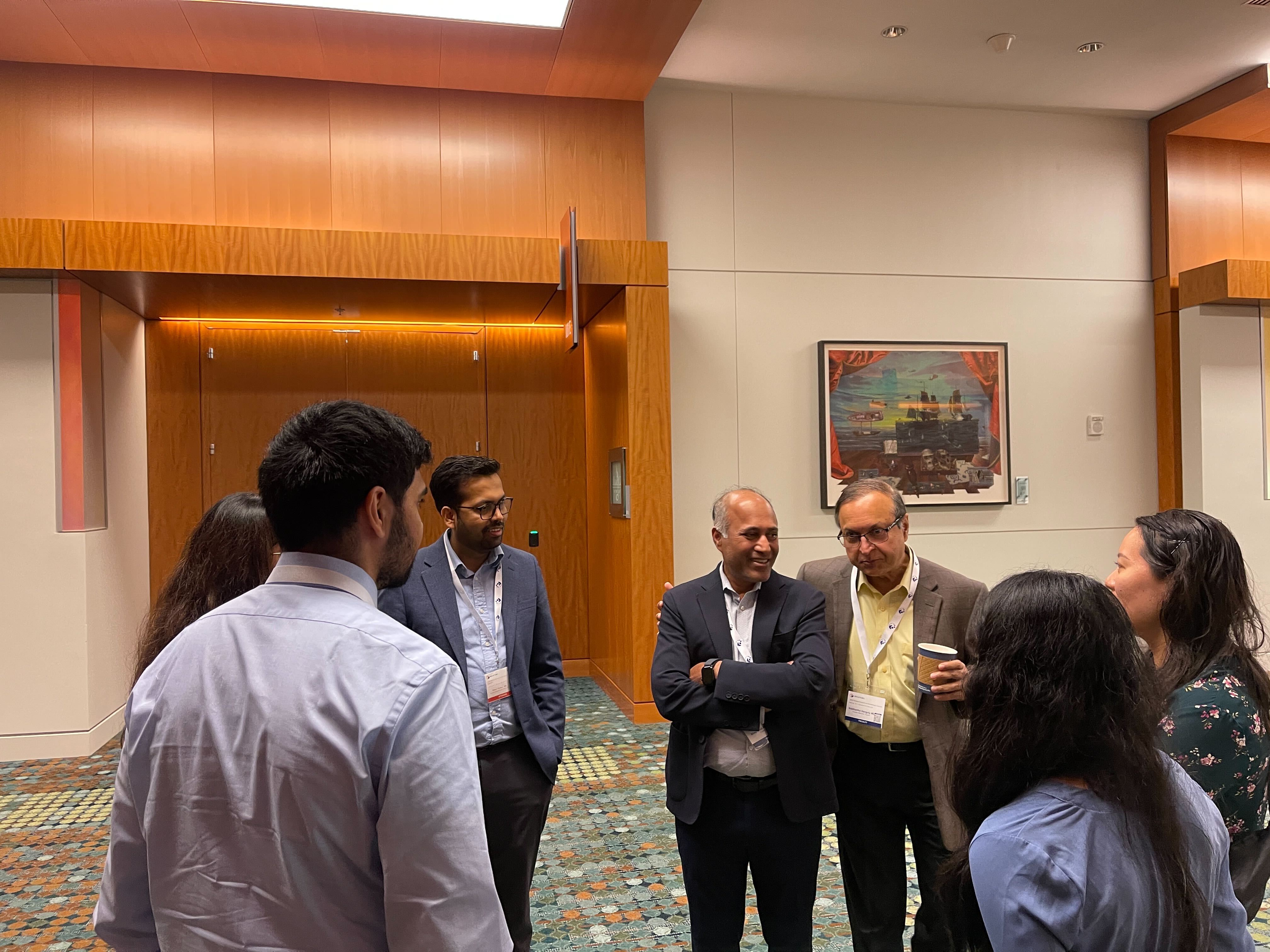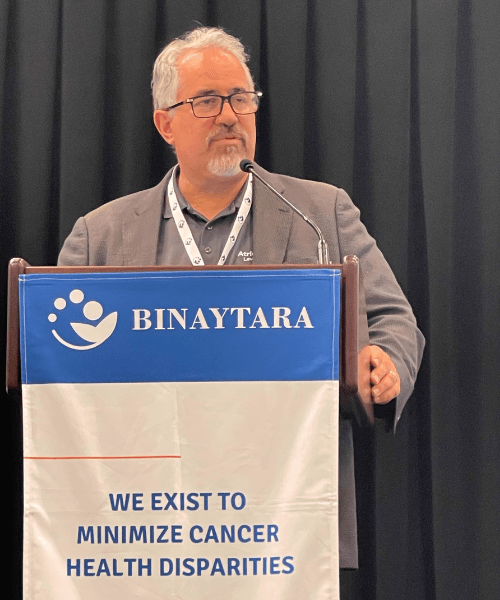Therapeutic Advances in Blood Cancers Showcased at Binaytara’s 2025 National Summit on Hematologic Cancers
Author
Binaytara Team
The National Summit on Hematologic Cancers kicked off in the Athens of the South, Nashville, Tennessee, on September 19, 2025. Attracting faculty members, healthcare practitioners, and exhibitors from across the country, this two-day continuing medical education (CME) conference was filled with scholarship, camaraderie, and a shared commitment to reducing disparities in cancer care.

Binaytara president, Dr. Shah, with a few conference attendees at #HemeSummit25
Keynote Speech Highlights
‘What to Expect for the Next Decade in CAR-T’
On September 19th, after the lunch break, the conference opened with a keynote on the future of CAR T-cell therapy in hematology. Dr. Marco Ruella, a hematologist specializing in immunotherapy, led the session. He is an Assistant Professor of Medicine in the Division of Hematology/Oncology and the Center for Cellular Immunotherapies. Also, he serves as Scientific Director of the Lymphoma Program at the Hospital of the University of Pennsylvania.
The keynote presentation highlighted yet-to-be-released efficacy data showing the transformative potential of CAR T-cell therapy, with 40% of patients disease-free at the 10-year mark. Looking ahead, Dr. Ruella foresees several developments over the next decade: the expansion of CAR T therapy beyond B-cell malignancies, improvements in efficacy and safety, integration with other treatment approaches, and increased efforts to improve access and delivery of CAR T therapy.
'What to Expect for the Next Decade in MPNs'
On the second day of the conference, another exciting keynote speech punctuated the afternoon poster abstract session. Dr. Ruben Mesa delivered a presentation on myeloproliferative neoplasms (MPNs), highlighting current progress in the field and the road ahead. He is the President of Advocate Health Cancer National Service Line and Executive Director of Atrium Health Wake Forest Baptist Comprehensive Cancer Center.

Dr. Ruben Mesa presents his keynote address on the future of MPN treatment.
Dr. Mesa recapped the current challenges in MPN management, including unanswered questions about why patients progress, defining success in early MPNs, the overwhelming amount of information causing confusion, building upon the beneficial experience of JAK inhibition, and risk aversion in advanced disease.
Looking ahead, Dr. Mesa expects that in the next ten years, MPN management may include:
- Continued importance of JAK inhibitors, both alone and in combination therapies.
- Development of targeted therapies based on driver mutations (e.g., JAK2, CALR).
- Increased understanding of disease progression mechanisms, leading to better-targeted treatments.
- Enhanced use of artificial intelligence in pathology and treatment decision-making.
- Improved identification of biomarkers for disease monitoring and therapy selection.
- Greater emphasis on combination therapies and sequencing of treatments to optimize patient outcomes.
- Expansion of clinical trial designs to include more diverse populations and real-world evidence.
- Advances in genetic therapy approaches potentially impact the natural history of MPNs.
- Improved transplantation strategies, focusing on earlier intervention for suitable candidates.
- Enhanced global data collection to better understand population-specific differences in MPNs and their management.
CME Highlights
Key Updates on Lymphoma Treatments and Emerging Research
Session 2, chaired by Dr. Nitin Jain (MD Anderson Cancer Center) and Dr. Marlise Luskin (Dana-Farber Cancer Institute), focused on aggressive lymphomas. Dr. Bhagirathbhai Dholaria, Associate Professor of Medicine at Vanderbilt University Medical Center, presented updates on CAR T-cell therapy for these diseases. He acknowledged that relapse and toxicity remain major challenges with current CD19 CAR T products but expressed optimism about early results showing that dual CD19/CD20 CARs may offer better efficacy with less toxicity. Additional presentations by Dr. Allison Winter (Cleveland Clinic) and Dr. Jeremy Pantin (TriStar Health) expanded on the management of aggressive lymphomas, including treatment considerations for elderly patients and outpatient care for CAR T-cell therapy recipients.
Session 6, chaired by Dr. Sonali Smith (University of Chicago) and Dr. Krish Patel (Sarah Cannon Research Institute), shifted the focus to low-grade lymphomas. Discussions covered second-line treatment for relapsed or progressive follicular lymphoma, the role of bispecifics in indolent lymphomas, and updates on mantle cell lymphoma therapies.
Key Updates on Leukemia Treatments in 2025
The medical oncology conference featured a wealth of sessions packed with updates on managing several types of leukemia.
In Session 1, Dr. Ryan Cassaday (Fred Hutchinson Cancer Center) reviewed initial treatment options for older patients with Acute Lymphoblastic Leukemia (ALL), highlighting the latest immunotherapy trial results, as well as financial and geographic barriers that many patients face, and how clinicians can help overcome them. Dr. John Molina, Medical Director at Case Western Reserve University College of Medicine, followed with practical strategies for incorporating CAR T-cell therapy into adult ALL care. Dr. Marlise Luskin, a senior physician at Dana-Farber Cancer Institute, focused on Philadelphia chromosome-positive B-ALL, sharing her approach to treatment and offering tips other healthcare providers can apply in their own practice. The session wrapped up with a lively Q&A and case-based panel discussion led by Dr. Guru Subramanian Guru Murthy (Medical College of Wisconsin).
Sessions 4, 5, and 7 highlighted updates on other leukemia types, including Acute Myeloid Leukemia (AML), Myelodysplastic Syndromes (MDS), Chronic Lymphocytic Leukemia (CLL), and Chronic Myeloid Leukemia (CML). These case-based discussions, led by top hematologists and oncologists from medical institutions and NCI-designated cancer centers across the country, explored key questions: What’s new in the field? Which therapies should be integrated into practice? How do you select the best treatment for a particular patient?
The sessions gave attendees both the big-picture updates and practical, real-world strategies to bring back to their practices, an invaluable resource for clinicians navigating the rapidly evolving world of leukemia care.
Key Updates on Management of Multiple Myeloma
In Session 3, the conference speakers explored the nuances of multiple myeloma management. Chaired by Dr. Peter Forsberg and Dr. Shaji Kumar, the session covered strategies for managing early relapses, the best approaches for newly diagnosed patients, the evolving role of transplant, and maintenance therapies for the disease.
Dr. Adeel Khan (UT Southwestern Medical Center) highlighted that relapses remain common in myeloma and that attrition across lines of therapy is significant. He emphasized that decisions for first relapse should consider patient age, risk status, and prior therapy, with cilta-cel as an option for younger, high-risk patients and conventional regimens like KPD for others.
Dr. Muzaffar Qazilbash (MD Anderson Cancer Center) discussed the evolving role of autologous transplant in myeloma. While high-dose melphalan remains effective, emerging targeted immune and cell-based therapies may offer similar or better outcomes with fewer side effects. Though he cautioned that evidence must guide any shift away from transplants.
On frontline therapy, Dr. Peter Forsberg (Colorado Blood Cancer Institute, Sarah Cannon Research Institute) reviewed the use of triplet versus quadruplet regimens for newly diagnosed multiple myeloma. He stressed that not all older or frail patients require a four-drug combination, and that well-chosen triplets can still achieve strong responses, highlighting strategies to tailor dosing and therapy intensity for older patients.
Finally, Dr. Siddhartha Ganguly (Houston Methodist Neal Cancer Center) focused on maintenance therapy. He recommended lenalidomide maintenance for most patients post-transplant, with the addition of anti-CD38 monoclonal antibodies for MRD-positive or anti-CD38 naïve patients, while noting that MRD-negative patients may safely discontinue maintenance after 2–3 years depending on risk status.
Overall, the sessions provided actionable insights into individualized treatment strategies, balancing efficacy, safety, and patient-specific factors in multiple myeloma management.
Poster and Oral Session Highlights
Practice-Changing Research in Hematology
Over 30 oral and poster abstracts were presented at the conference by medical students, residents, fellows, and physicians. These presentations included unique case reports on various hematologic cancers, original research on therapy developments, analyses of disparities in cancer outcomes, and more. All presenters were recipients of a $1000 travel grant award.
The top 6 abstracts were selected for oral presentation. The speakers represented several institutions across the country: University of South Florida, Cleveland Clinic, Moffitt Cancer Center, Vanderbilt-Ingram Cancer Center, University of Tennessee, and Huntsman Cancer Institute. These oral presentations were well-rounded, covering research on new treatments, exploring unanswered questions in blood cancers, and examining non-medical factors that impact patient outcomes.
For example, one of the oral abstracts titled "Neighborhood socioeconomic disadvantage and distance from treatment center do not impact survival outcomes of patients with non-Hodgkin’s lymphoma and Multiple Myeloma treated with CAR T-cell therapies," highlights the need for cancer disparities research. As the conference co-chair, Dr. Navneet Majhail, noted, “if a patient who needs CART can get to this therapy, the social disadvantage factors are mitigated and their outcomes are the same as a patient who does not face these barriers. We do recognize that some patients cannot access CART therapy, and we need to intensify efforts to remove access barriers.” This is just one of many abstracts at the conference demonstrating that research on the impact of social determinants of health in cancer care is equally vital as research on improving treatment options.
Also, the poster sessions sparked intellectually stimulating discussions, encouraging presenters to think critically and consider next steps in their research. After careful evaluation of all poster presentations, Dr. Amisha Fnu from Moffitt Cancer Center emerged as the winner of the best poster abstract. Her presentation, titled “Outcomes of Patients with Concurrent Chronic Lymphocytic Leukemia (CLL) and Non-Small Cell Lung Carcinoma (NSCLC),” retrospectively analyzed patients diagnosed with both CLL and NSCLC, uncovering common risk factors and genetic mutations in this patient population. Dr. Fnu’s presentation also showed that patients diagnosed with both CLL and NSCLC are at an increased risk of developing a third primary cancer. This abstract, including others presented at the conference, is now published in the International Journal of Cancer Care and Delivery (IJCCD).
Dr. Fnu receiving the best poster presentation award at #HemeSummit25
Testimonials
What Attendees are Saying About Binaytara’s CME Conference
Our medical oncology conferences are designed to engage healthcare providers from all specialties, training backgrounds, and experience levels. With cancer education as a foundation, meaningful networking opportunities, and eliminating disparities as a driving force, we deliver a unique experience that leaves attendees up to date on the latest knowledge in cancer and equipped with actionable strategies they can implement in their practice. Here are what some attendees had to say about the National Summit on Hematologic Cancers.
Connie Lee, ARNP: | Sarah Cannon | Community Practice
“Thank you for such an insightful experience. I look forward to digging deeper into many of the studies mentioned throughout the weekend to better understand treatment strategies.”
Ryan Cassaday, MD: University of Washington / Fred Hutch
“'I appreciated the structure of the course, with a few relatively short talks on key topics followed by a longer period for Q&A.”
Michael Madsen, PharmD: AstraZeneca
“Wonderful venue. Please use Music City in Nashville again for your conferences. it is wonderful to have 20-30 minute breaks for networking.”
Explore Our Upcoming Oncology Conferences
All our hematology oncology conferences are multidisciplinary and are designed for physicians, advanced practice providers, pharmacists, nurses, and other healthcare professionals committed to advancing cancer care. We strongly believe that targeted CME and cross-institutional collaboration are essential to expanding the reach and impact of novel cancer treatments.
Interested in advancing your knowledge, earning CME/ACPE credit, and joining a growing network of oncology professionals dedicated to health equity? Learn more at the Binaytara Education Academy.